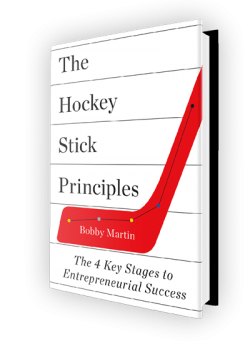Dr. Evil, the menacing, quirky character in the 1997 spoof “Austin Powers: International Man of Mystery” literally builds an empire in his sleep. The scene plays out when Dr. Evil introduces his associate, “Number 2” (the man with the eyepatch), who runs Virtucon, the legitimate face of his evil empire. Using miniature models on a map of the U.S. that light up, Number 2 shows Dr. Evil the enormous, successful businesses he has built while Dr. Evil was asleep for 30 years. Could you do the same with your own startup? Could you hire a Number 2 and just sleep?
The Blade
Thoughts for entrepreneurs from someone who's been in the trenches.
A Startup is 10,000 Little Details – All Smooshed into One
If you are starting a startup and find yourself spinning your wheels with seemingly unimportant details and therefore can’t get any “real” work done, you’re not alone. If you’re like me, you feel overwhelmed with tasks that don’t appear to provide a return on your time investment. For example, I spent two hours buying a new printer because the one I bought nine months ago doesn’t work anymore, and the company’s support desk says I need the receipt, but I don’t have the receipt…you get the idea. Sheeeez – that’s two hours of my life I’ll never get back during which I could’ve been calling prospects or marketing or something. This story happens to all of us.
What really drives startup revenue growth? The answers may surprise you.
In 2012, tucked away at a cozy table in Global Village Coffee House writing The Hockey Stick Principles, I was plotting the revenue growth curves for a few successful startups. I wondered what factors influenced their revenue growth. So, I searched for studies, and to my dismay, I had little luck. I was looking for answers to questions such as:
- How quickly does revenue typically grow for different types of startups?
- How long does it take for a startup’s revenue to take off and grow faster?
- Does the age of the founder make a difference relative to revenue growth?
- Do startups with multiple founders grow to become larger than those with only one founder?
- Which industries grow revenue the fastest?
Because I couldn’t find what I was looking for, I decided to embark on my own research study.
Clarifying the Confusion with Startup Terms
I confess: I’ve spent the past several years confused by terms related to starting a company. Only recently have I begun to understand the nuances between words I hear and read every day. Given that others have told me they are also confused, I figured I’d try to clarify the confusion. Here goes…
Entrepreneurs start and own any type of business. That includes restaurants, home-building firms, decorating firms, law firms, tech firms, retail stores, solo businesses—really any type of company. Merriam-Webster offers this simple definition: “A person who starts a business and is willing to risk loss in order to make money.” So entrepreneurs take on the risk and reward of the enterprise as the owner.
6 Tips for Nailing Your Pitch
During the past five years, I’ve probably heard 300 founder pitches. No joke. Unfortunately, most founders are very bad at pitching; I’ll be the first to tell you that it’s difficult to do it well. It was 1999, and I’ll never forget my brother-in-law having to step in to clarify to a mutual friend what the heck First Research’s value proposition was. I’m good at some things, but as a pitchman, I’d failed. It was an embarrassing moment since First Research was my idea.
What’s a pitch?
Simply put, your pitch is how you explain your idea to potential customers, investors, and partners. If you suck at it, which most of us do, then few people will be interested in what you’re doing. If you are good at it, you will succeed more often.
What’s the Deal with the “Carried Interest” in Trump’s Tax Plan?
Why This Tax “Loophole” Could One Day Affect You
On Sunday night, Donald and Hillary debated “carried interest.” Trump and Clinton both said they want to eliminate it. What is carried interest and how does it affect startups? Simply put, on the surface, carried interest is one of the many self-serving-for-rich-people tax loopholes. But let’s dig deeper.
What is carried interest?
Carried interest is a 50-year-old tax provision that allows executives at venture capital, private equity, real estate, and other partnerships to classify much of their income as capital gains. Long-term capital gain (e.g., purchasing an asset for $1,000,000 and selling it for $1,500,000) is taxed federally at 20 percent. Earned income is taxed between 28 and 40 percent.
Luck, Circumstance, Skill or Persistence? Which Leads to Startup Success?
Last week, I shared with MBA students at Georgetown University my research on how founders discovered hockey stick revenue growth. A few of these entrepreneurs focused on one market, working on their entire business model, finding early adopter customers, and building a remarkable brand. One student asked a challenging question: “What about founders who did all those things and still weren’t successful? Did their actions make the biggest difference, or was most of their success a result of luck or circumstance?”
His question really got me thinking. I know founders who showed great skill and patience but who still weren’t successful. In 2006, my friend Tim Horan started Becooz, a website application neighbors use to share profiles, information about service providers, and neighborhood happenings. Becooz is like Facebook-meets-Citysearch—useful for tight circles of neighbors and friends. Local media companies are the primary paying customers because they benefit most from Becooz’s access to targeted advertising.
What Bruce Springsteen’s Father Taught Me About Entrepreneurship
Singer, songwriter, and winner of 20 Grammys, Bruce Springsteen often wrote songs about his father Douglas’ career. “My dad had a difficult life, a hard struggle all the time at work. I’ve always felt like I’m seeking his revenge,”[1] Bruce recalls. In a separate interview, he lamented, “My father worked a lot of jobs that take everything from you and give you barely nothing back. Some people get a chance to change the world, and other people, they get the chance to make sure the world don’t fall apart.”[2]
The impact of disappointment at work was devastating to Douglas. He would cut the lights off in the house at nine o’clock at night and sit with a six-pack and cigarette. Bruce explains, “… as I got a little older, I’d watch my father, how he’d come home from work and just sit in the kitchen all night like there was something dying inside him, or like he’d never had a chance to live… .”[3]
How Raving Success Can Lead to a Tired, Tarnished Brand
As your company grows, don’t let it become “tired.”
 As a youngster growing up in Raleigh North Carolina, my down-home college team was the N.C. State Wolfpack. My buddy Byron’s father had season tickets in the charming Reynolds Coliseum. Hardly sophisticated, it was more like an old-school gym than a modern basketball facility. The place was hot, its seats were too small, and it didn’t have adequate restrooms. But it was loud, energetic, and felt like home to me. Byron and I howled like wolves as the team scored baskets. Hoowwwwwwllllll. I loved that team, that setting, that…brand. It was simple and likable.
As a youngster growing up in Raleigh North Carolina, my down-home college team was the N.C. State Wolfpack. My buddy Byron’s father had season tickets in the charming Reynolds Coliseum. Hardly sophisticated, it was more like an old-school gym than a modern basketball facility. The place was hot, its seats were too small, and it didn’t have adequate restrooms. But it was loud, energetic, and felt like home to me. Byron and I howled like wolves as the team scored baskets. Hoowwwwwwllllll. I loved that team, that setting, that…brand. It was simple and likable.
But today, the Wolfpack’s likability and charm are gone. The ‘Pack has gone corporate and is constantly trying to sell me something. The old Reynolds Coliseum has been replaced by the swanky, modern “PNC” arena. Advertisements flashing constantly across screens cloud the old-school charm. Each timeout is used to recognize some sponsor or some donor who did something great. I just received an offer to join N.C. State’s “Legacy” Club” by donating $240 to honor all those who wore #24. Really? In order to buy tickets, I have to donate to have the right to buy the tickets?
A Crash Course in Startup Jargon
With subcultures come jargon. Every group from snowboarders to computer programmers to musicians has lingo that is native to the culture, though to outsiders, it sounds like a foreign language. I often meet 20-something investment bankers on airplanes. When I ask what they do for a living, they look put out and say, “I trade buy-side covered call derivatives for our institutional and high net worth clients, etc., etc.…” and I think, “So in simpler terms, you’re a trader.”
Talk the talk
Like the financial industry, the startup subculture has its own semi-obnoxious colloquialisms. In case you’re intimated by all the fancy pants startup talk between your friends, here are the plain-English translations of some of the trickiest startup words:








